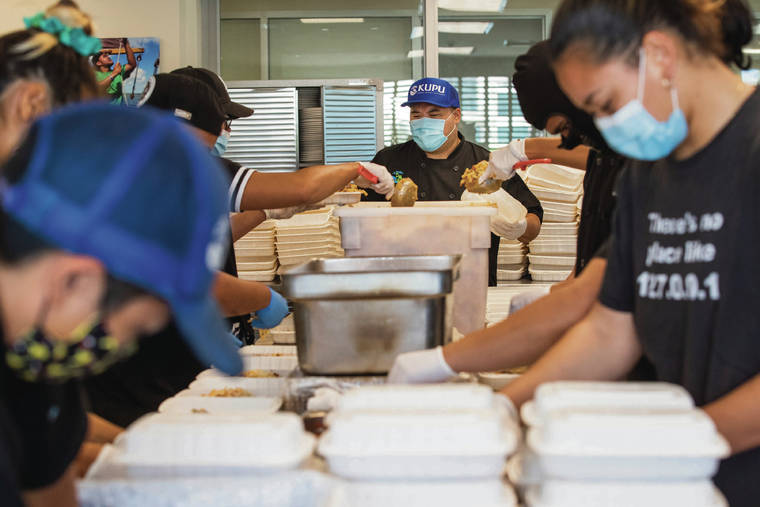Column: Youth power: Green jobs, together with youth corps, can revive our communities

CINDY ELLEN RUSSELL / CRUSSELL@STARADVERTISER.COM
Students in Kupu Hawaii’s culinary arts program prepare 1,000 meals a day. Pictured in the center, supervising the packaging of meals with youth participants, is Kupu’s Kaimana Lee.
Hawaii, which once had the lowest unemployment rate nationwide, now has the highest, with nearly a quarter-million residents out of work during this pandemic. While this may seem dismal, now is the time to engage hands and hearts to build out a better Hawaii through a new green workforce founded in service, environment and values-driven skills development.
In the 1930s, President Franklin Roosevelt created the Civilian Conservation Corps (CCC) in response to The Great Depression. The CCC’s goal was to hire young, unemployed men in their late teens to early 20s for forestry, soil, conservation and recreation projects. In Hawaii, this materialized as the Emergency Conservation Work Program. About 7,000 men took on jobs that included clearing brush from trails and planting native trees, similar to what Kupu and our partner organizations do regularly.
The overarching result was one of the most successful New Deal initiatives that contributed to America rebounding into the strongest economy in the world.
Caring for the land and each other is already inherent in Hawaii. Native Hawaiians developed the ahupua‘a, a land management concept that encouraged collaborative resource management so all in the community thrived. Today, aina-based education and service is growing.
Nonprofit and government groups like Pae Pae o He‘eia, Waipa Foundation, Ma‘o Organic Farms, Ma Ka Hana Ka ‘Ike, and the U.S. Forest Service on Hawaii island are guiding the way to manage lands and engage community. The Department of Education, many of Hawaii’s private schools and most charter schools have come to embrace aina-based education or outdoor service-based curriculum.
Yet, despite this emerging desire, there is a gap between progressive aina engagement and current workforce offerings.
Don't miss out on what's happening!
Stay in touch with breaking news, as it happens, conveniently in your email inbox. It's FREE!
Youth corps are a perfect way to bridge that gap and create new jobs for Hawaii, get important work done, and combat unemployment. For example, Kupu has been able to connect private companies, nonprofits, local government entities and universities in partnerships that create hands-on education and job training that Hawaii’s youth can apply in real-world settings to preserve our natural resources, protect watersheds, increase food security and problem-solve the many challenges global warming presents to us, the most isolated landmass on Earth.
Through a new partnership with Arizona State University, Kupu participants can get a full year of college online fully covered by their AmeriCorps education award. This is both equity and opportunity for so many seeking options since COVID-19 disrupted so much.
For every dollar invested in youth corps, there is close to a $4 community return on investment nationally. Prioritizing sustainable land-based economic revenue streams, investing in conservation of our natural and sustainable infrastructures, species preservation and evolving from mono-crop exports to food sovereignty are all areas in which a green workforce can support and position Hawaii to have a greater degree of economic diversity and resiliency.
Youth corps build healthy character and capacity. Young people learn the value of hard work from having to backpack for miles, camp under the stars, and conduct work that pushes them to their limits. Corps also create an inclusive family that unifies beyond race, socio-economic background, and beliefs. Youth corps provide a solution most party lines can agree with as they provide a hand up, not a handout to do necessary projects in a cost-effective manner while meeting environmental and social needs.
Many of Hawaii’s leading conservation professionals have participated in youth corps or partnered with one, moving from corps to careers. If we start building now, growing our green workforce can inspire our local residents, visitors and the global community to create a more resilient future in which we can all thrive.
John Leong is a current Obama Foundation Fellow, social-entrepreneur and founder/CEO of Pono Pacific and the nonprofit Kupu.




